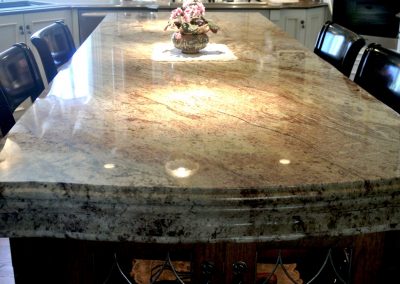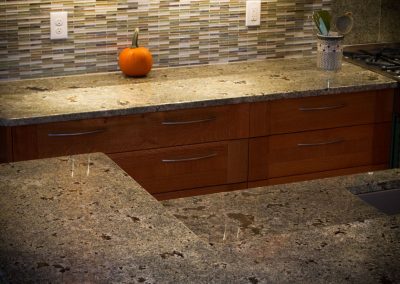Granite Countertops Denver
WHAT IS GRANITE?
Granite is the natural stone most often quarried as a “dimension stone” (a natural rock material that has been cut into blocks or slabs of specific length, width and thickness). Granite is hard enough to resist most abrasion, strong enough to bear significant weight, inert enough to resist weathering and it accepts a brilliant polish. These characteristics make it a very desirable and useful dimension stone for both kitchen and bathroom countertops.
Granite has been used for thousands of years in both interior and exterior applications. Indoors, polished granite slabs and tiles are used in countertops, tile floors, stair treads and many other practical and decorative features.
Pricing is based off of popularity and availability. However, granite is frequently selected because it is a prestige material, used in projects to produce impressions of elegance, durability and lasting quality ideal for fabricating beautiful granite countertops.
WHY SHOULD I CHOOSE GRANITE FOR MY COUNTERTOPS?
There are a number of different types of stone used for kitchen countertops, such as granite, quartz, marble, onyx, limestone, and soapstone. Granite is the best kind of stone to use in your kitchen, due to its versatility, range of colors and extreme durability.
Granite is one of the hardest types of stones in the world making counters that are incredibly stain, scratch, and chip resistant which will last the lifetime of the home.
HOW DO I CARE FOR MY NEW GRANITE COUNTERS?
Sealing your granite is one of the most important things you can do to maintain the beauty of your granite countertops. Sealing granite is one of the things that scares people away from having a granite countertop. Sealing stone countertops is very simple and easy to do. Using an impregnating sealer once a year is recommended.
Some granites need to be sealed more often than others, especially the lighter ones. A good “rule of thumb” is to do it every year. Some sealers are rated for 10- 15 years, however depending on the stone and how it is cared for it may need sealed more often.
Cleaning your counters is very simple too! The safest way to clean your Granite is with a mild soap and water. Do not use acidic cleaners such as bleach, vinegar or other harsh materials
STAINING & SCRATCHING GRANITE
Generally, any liquid spilled on a granite top, if wiped up within a few minutes, will not stain. However, even water can soak into a granite countertop and leave a dark colored spot but this will evaporate in minutes. Liquids that do not evaporate, such as oils will cause stains if left to soak into the stone.
Granite counters are heat resistant and can withstand the heat of hot pots and pans without damage to a certain temperature. Impact from a heavy object may chip granite.
RADON & GRANITE
Since granite is generally not very porous, lessradon is likely to escape from it than from a more porous stone such assandstone. It’s important to know that radon originating in the soil beneathhomes is a more common problem and a far larger public health risk than radonfrom granite building materials. Also, any radon from granite countertops inkitchens or bathrooms is likely to be diluted in the typical home since thoserooms are usually well ventilated.
In addition to radon, the other natural radioactive material in thegranite can emit radiation. However, it is extremely unlikely that granite countertops in homes could increase the radiation dose above that the normal, natural background dose that comes from soil and rocks.
Source- http://www.epa.gov/radiation/tenorm/granite-countertops.html

